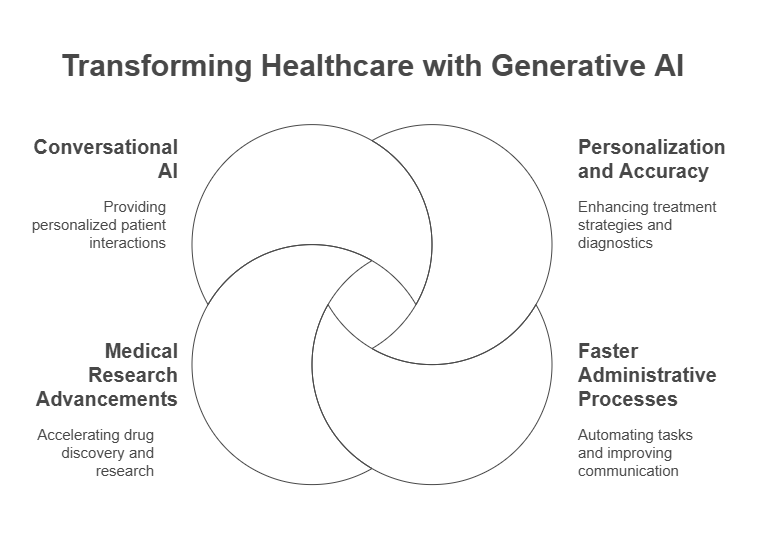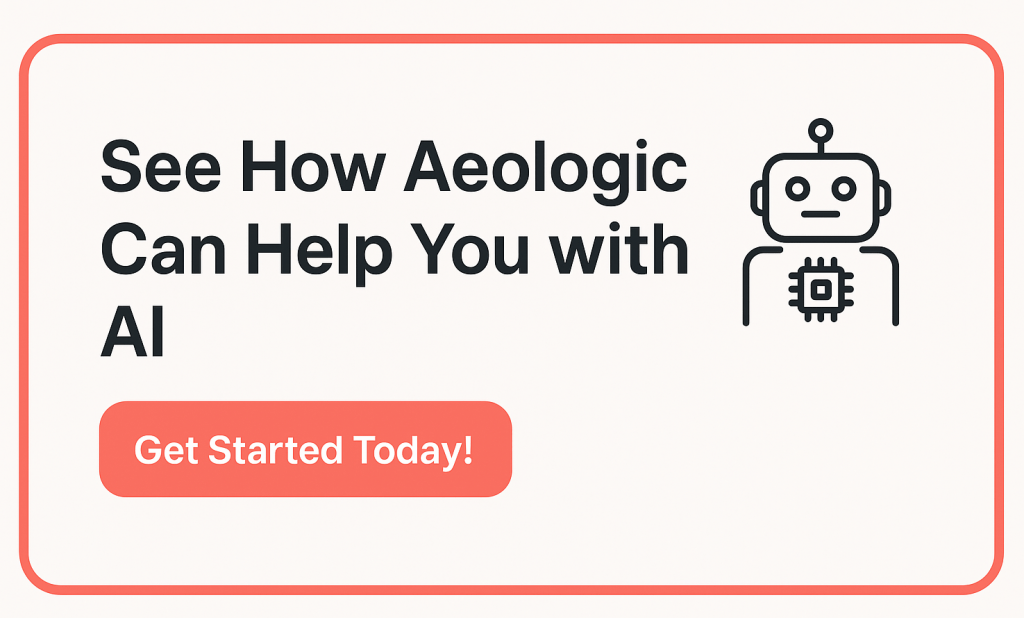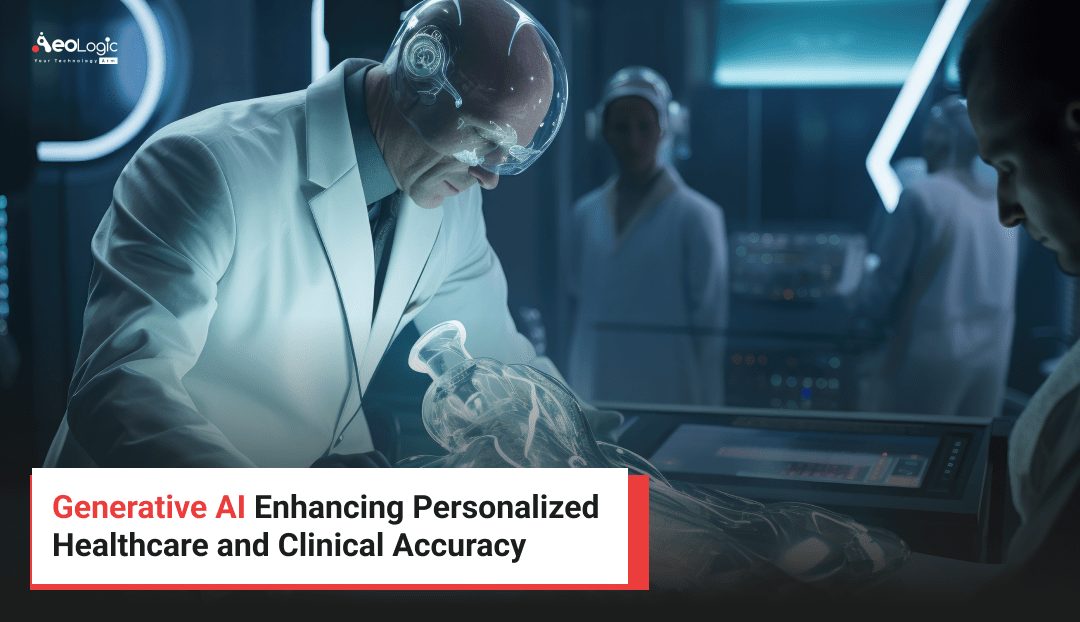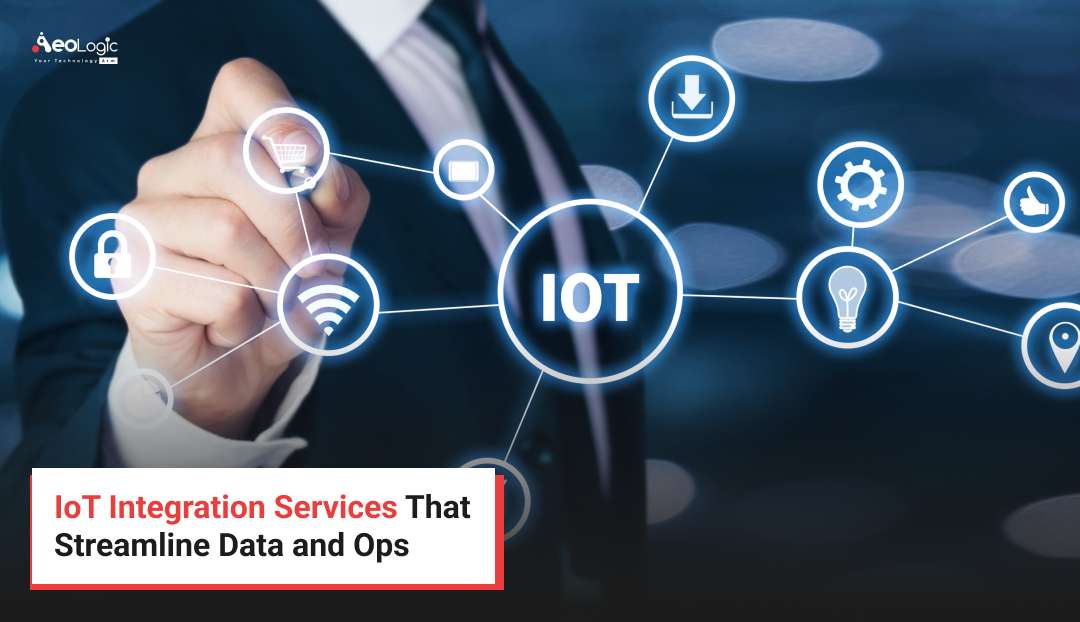The healthcare industry is transforming with the rise of generative AI, as this technology has provided various reasons that the healthcare industry will appreciate in the upcoming years. Since the digital transformation era, every industry has started to revolutionize healthcare with Generative AI in personalized healthcare solution. But still, there are many healthcare organizations or regions that have followed the conventional methods, which make them face various challenges.
The key challenges faced with the traditional methods are a lack of personalized treatment and inaccuracy in clinical operations.
Apart from these challenges, there are also various challenges like bad decision-making in critical situations, security issues, administration workflow burden, time-consuming tasks, and much more. The healthcare organization that has implemented generative AI has been in a much better situation.
Personalized treatment has been the most trending aspect in modern healthcare, which has been more solidified with the generative AI integration. The generative AI can analyze the patient’s conditions, past medical records, and current symptoms to provide the most personalized treatments. Whether it is medicine, diagnostics, scheduling, or remote monitoring, everything can be personalized with the gen AI solutions.
To make patient care more enhanced, clinical accuracy also matters the most, like right documentation, accurate results of diagnosis, validation, and much more, which definitely can be enhanced with the gen AI algorithm that overall boosts the efficiency of patient care and healthcare organization.
Key Statistics: Generative AI in Personalized Healthcare
The global generative AI in healthcare market size was valued at USD 2.59 billion in 2024 and is expected to be worth around USD 29.05 billion by 2034. It is growing at a compound annual growth rate (CAGR) of 27.34% from 2025 to 2034. A significant portion of healthcare organizations are actively implementing or planning to implement generative AI, with 46% of U.S. healthcare organizations in the early stages of implementation, according to a Forrester report.
75% of leading healthcare companies are experimenting with or planning to scale Generative AI across the enterprise. In Q1 2024, a majority of healthcare leaders said that their organizations are either already using gen AI tools (29%) or are testing them out (43%). 64% of patients would be comfortable with artificially intelligent virtual nurse assistants. Potential benefits from the integration of AI technologies into healthcare are:
- Predictive analysis and early detections (83%);
- Automated administration tasks (85%);
- Enhanced diagnostic accuracy (76%).
Generative AI: What Is It?
Generative AI encompasses artificial intelligence systems that create new or unique data using advanced machine learning techniques, such as Large Language Models (LLMs) and Generative Adversarial Networks (GANs). These systems can produce creative, realistic text, photos, videos, and media based upon their capacity to analyze and learn from massive datasets.
Large Language Models (LLMs): AI models that read and process enormous amounts of text data. They are suited for tasks like writing medical reports because they can generate logical and relevant content in context.
Generative Adversarial Networks (GANs): A GAN consists of two neural networks: a discriminator and a generator. The discriminator is trying to distinguish real data from generated data, while the generator is creating new data. This adversarial process continues to make the generator more able to create outputs that resemble real data.
What is Generative AI in Personalized Healthcare?
Generative AI in healthcare refers to integrating gen AI-powered solutions to healthcare operations to enhance efficiency and productivity with automation, data-driven decision making, and personalization. Generative AI solutions are well-trained in machine learning and have the potential to make the right or near-perfect decision by analyzing the various data from different sources.
It contributes to the enhancement of personalized healthcare and clinical accuracy by personalized medications, personalized scheduling for staff and patients, personalized treatment plans, best diagnostics techniques, documentation automation, and much more. Overall, generative AI solutions are great tools in terms of boosting personalized health and clinical accuracy for many years.
Explore more: How GenAI Is Revolutionizing The Pharmaceutical Industry?
Benefits of Using Generative AI for Healthcare Providers

Greater Personalization and Accuracy
With generative AI capable of extracting interesting insights from sizable patient data arrays, it is easier to investigate large-scale patient datasets to develop individual treatment strategies. And the diagnostic capacities can be significantly improved with LLMs that recognize more complex patterns in imaging and medical reports than most human specialists would be likely to identify.
Faster Administrative Processes
Generative AI will assist healthcare teams by automating tasks like summarizing data and preparing medical reports, meaning they spend less time on administration and focus on delivering process-minded patient care. Additionally, efficiencies will develop when generative models drive conversational AI to support telephone communications and appointments with patients.
Fundamental change to Medical Research
Generative AI can assist in medical research as it quickly synthesizes large-scale scientific literature and reveals potential new areas of research. LLMs can also evaluate existing data to discover new drug targets that expedite the drug discovery process.
Conversational AI
We are witnessing a fundamental change in the interactions of patients and providers with technologies such as generative AI-powered chatbots and virtual assistants, which will link patients with very personalized and empathic care at any time of the day or night, support appointment scheduling, respond to patient inquiries, and even dispense rudimentary medical information.
Also Read: The Benefits of AI Automation in Healthcare Industry
Applications of Generative AI in Personalized Healthcare
There are various applications of generative AI in personalized healthcare for enhancing clinical accuracy. Here are the key applications mentioned below.
Genomics and Precision Medications
Some diseases, like cancer or any other rare diseases, require some special precision medications. But the traditional or manual system cannot analyze the genome of patients properly.
Where the generative AI-powered solutions or systems can perform tests on the genome of the patients to understand their disease structure. They provide the right formula for the medications in the right proportion that suits the patient efficiently.
Customized Treatment Plans
If treatment plans were customized on the basis of specific patients, then surely it would be more effective. But the traditional healthcare solutions do not offer that kind of customization in treatment plans, which takes too much time to cure patients.
Generative AI-powered solutions can analyze the patients’ conditions, past medical reports, lifestyle to provide the best customized treatment plans that suit their lifestyle and body in a much better manner.
Also Read: Role of Generative AI Solutions for Businesses Growth
Predictive Modeling
Sometimes, there could be conditions that a patient cannot bear or perform well under any treatment. This could result in a risk to patient lives or adverse conditions. But what if doctors can have an idea of how a patient would perform any specific operations or treatment?
The generative AI-powered solutions can analyze each and every aspect of patients’ conditions and make data-driven predictions with different treatment scenarios that how the patient would perform. This helps doctors to take all necessary precautions to save the patient’s life.
Personalized Drug Discovery
Drugs or medicines are the key aspect in the treatment of patients. But the traditional healthcare system involves generalizing medicines for every kind of patient, which sometimes does not have a good effect. Every patient has their own body design and capability that should be kept in mind before the drug discovery.
The generative AI solutions have patients’ data that are analyzed to provide the formula, ratio, and type of drugs to discover what makes each patient recover faster in comparison to general medicines. 
AI-Assisted Diagnostic
During various diagnoses, different types of medical images are formed. It is important that the medical images are clear and informative about the patient’s problems. But sometimes, due to any technical issues, the medical images could be missing or of poor quality.
Generative AI integration with the diagnostic machines and AI healthcare software can regenerate the missing images and enhance the quality, which helps to detect the problems more accurately.
Error Reduction
Sometimes the manual handling of patients’ data can be involved in human error that results in wrong treatment or wrong medications. This directly affects the lives of patients, which should be prevented at any cost. The generative AI integration with the system can detect the anomalies and patterns to detect the error as soon as possible. Also, it offers the automatic correction of errors that prevent any type of unfortunate incidents during the patient treatment.
Also Read: Benefits of AI in Healthcare for Patient Care
Early Disease Detection
Many diseases cannot be detected at an early stage, which could result in death in the future. The traditional technology is not able to detect some diseases in the early stage, and when detected then it would be too late. The generative AI algorithm can continuously monitor the patient’s data, and any type of disease affecting cell generation can lead to a warning to the doctors. This helps to detect deadly diseases in an early stage, to take the necessary treatments at the right time.
Synthetic Data Generation
During various treatments, the available data could be less to analyze the patient conditions and make proper treatment plans. The traditional system is also not capable of generating data from any sources. The generative AI solutions have the potential to generate synthetic data on the basis of the availability of limited data. This helps to analyze the patient’s condition and continue the treatment that was stopped due to insufficient data.
Cost of Implementing Gen AI in Healthcare In 2025
Implementing generative AI in personalized healthcare in 2025 involves a wide range of costs. It initial investments to ongoing maintenance and training. While the specific cost can vary significantly based on factors like solution complexity, infrastructure, and integration, estimates range from $250,000 to $500,000+ for GenAI/LLMs, with cloud-based solutions for mid-sized hospitals costing $50,000 – $200,000 annually.
Individual Costs of Different Factors
Here are the individual factor costs mentioned below.
- Complex, custom AI solutions, especially those involving advanced diagnostics or robotic systems, can exceed $10 million.
- Custom AI models require 6-12 months of development and cost 30-40% more than off-the-shelf solutions.
- AI implementation demands high-end cloud storage and computational power, costing $100,000 to $1 million per year.
- Upgrading legacy systems for AI compatibility can increase initial costs by 20-30%.
- Compliance audits cost $20,000 to $200,000 annually, depending on the AI application. HIPAA or GDPR violations can lead to penalties exceeding $1.5 million per violation per year.
- AI maintenance expenses range from 15-25% of the initial development investment per year. When compliance and security costs are added, the yearly cost can be 30-50% of the initial investment.
After analyzing these factors and costs, you will get the estimated overall cost of gen AI solutions for healthcare. The overall costs could vary or differ for everyone based on their individual factors.
Also Read: How Your Hospital Can Automate Patient Reports Using Generative AI
How Hospitals Can Integrate Generative AI in Personalized Healthcare Systems?
Hospitals have a number of opportunities to leverage generative AI with existing systems in place. We discuss a process for doing this.
Understand Current Technologies and Systems
Having a good grasp of the IT landscape and data management structure will help hospitals understand which AI systems can be layered on and how to do it without much disruption.
Determine Priority Use Cases
Developing a list of use cases in which generative AI adds significant value is helpful. Common use cases include medical imaging, summarization of patient records, and creating personalized treatment plans.
Partner with Established AI Vendors
Hospitals that work with existing and trusted AI software companies like Aeologic who specialize in healthcare solutions, will benefit from the experiences, expertise, and understanding of the various healthcare space.
Consider Patient Data Privacy
Hospitals must still meet a range of healthcare legislation and protection around patient data privacy such as HIPAA when adding AI systems.
Train Staff and Clinicians
Training sessions will be necessary to guide healthcare professionals through how to utilize AI tools in their everyday work as efficiently as possible.
Pilot Project(s) are executed
Hospital leaders should first execute generative AI in a limited geographical or departmental area as part of a pilot project(s). It will make it possible to evaluate performance and make adaptations before spreading to a larger audience.
Measure and Adapt
Hospital system responses to the generative AI tool must continue to be measured, and feedback provided from users.
Also Read: The Impact of AI On Hospital Management Systems
Final Take
Generative AI-powered solutions are the revolutionary steps towards the development of personalized treatment and better clinical accuracy for every region, nation, and organization. This is not just an integration of technology into the healthcare industry, but this is also a tool that surely enhances the ways of saving patients’ lives in a much better manner.
Overall, the generative AI solutions can be referred to as a lifesaver and the most significant cause of advancement and a digital transformation for the healthcare industry.
FAQs
How can generative AI improve clinical decision support systems?
Generative AI strengthens clinical decision support systems by:
- Evaluating Complex Data: Providing analysis of patient data at scale including patterns that identify outcomes.
- Customizing Treatment Plans: Creating treatment recommendations based on the history of a patient and their current health.
- Improving Diagnostic Accuracy: Providing second opinions and identifying complications of which clinicians may not be aware.
For example, the AI Diagnostic Orchestrator produced by Microsoft has shown remarkable performance improving the accuracy of diagnosing multifaceted medical cases in comparison to doctors.
Can generative AI increase the accuracy of clinical diagnoses?
Indeed, generative AI can enhance accuracy in clinical diagnosis by processing a massive amount of data about patients accurately and swiftly and evaluating categorization in a way that human clinicians may overlook. It serves as a second opinion, notifies clinicians of risks. It allows clinicians to take informed decisions, minimizing mistakes and improving patient outcomes. The totality of clinical interpretation with all types of data reduces inevitable errors that humans may have otherwise made.
What types of patient data does generative AI use for personalized care?
Generative AI leverages a variety of patient data, regardless of database. So that patients’ Health Information would be drawn from electronic health records (EHR), medical imaging (X-rays, MRIs), lab results, genetics, and even symptom reporting patients themselves. On some level, the ability to include and synthesize these materials allows better care protocols specific to each individual patient.
How secure is patient information when using generative AI in healthcare?
Data security when employing patient data security protocols is a priority. Relatively new reputable AI solutions are able to employ security technologies. It secure data with advanced encryption, anonymize patient data and adhere to healthcare regulations like HIPAA and GDPR. Health care systems were premised on securing sensitive information to protect patients and instill confidence.
How does generative AI assist in personalized treatment planning?
Generative AI enhances personalized treatment planning by :
- Synthesis of Information Relating to a Patient: Clustering information from disparate sources, such as electronic health records and medical imaging to profile the health of a patient.
- Treatment Outcome Simulations: AI models that can predict a patient’s treatment response to different therapeutic options.
- Recommendation of Personalized Therapies: Generative AI that can produce a customized treatment plan given the patient’s treatment needs and preferences.
For example, ConcertAI’s Precision Explorer leverages generative AI to conduct real-world evidence analysis to assist personalized oncology plans.
What are some examples of generative AI applications in clinical decision-making?
Generative AI can be utilized for diagnostic reporting. It develops personalized treatment recommendations, assisting with the interpretation of medical images, predicting disease progression, or in automating clinical documentation.
For instance, AI tools can recommend therapies for cancer patients based on their unique profile. Also, support radiologists’ interpretation of scans at a quicker pace.

I’m Deepika Pandey, an SEO strategist and content writer with 6+ years of experience. I create SEO-friendly content that drives traffic and engages readers. I combine data insights with creativity to help businesses grow their online presence effectively.






